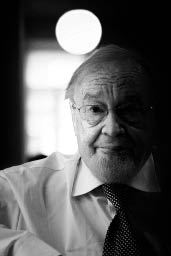In memoriam Paavo Haavikko 1931–2008
30 December 2008 | Authors, In the news

Paavo Haavikko. Photo: Kai Widell.
The poet, writer, playwright and publisher Paavo Haavikko died in Helsinki in October, at the age of 77.
Haavikko was one of Finland’s most internationally recognised writers, and his success was helped by many prominent poets’ interest in his lyric poetry. His work was translated by Anselm Hollo and Herbert Lomas (English), Manfred Peter Hein (German), Bo Carpelan (Swedish), and Gabriel Rebourcet (French), among others.
Haavikko debuted in 1951 as a lyric modernist who broke through all of modernism’s barriers. He was a master of intoxicating lyricism, and an intellectually discerning storyteller of general truths in his narrative poems. His collections Talvipalatsi (‘Winter palace’, 1959) and Puut, kaikki heidän vihreytensä (‘The trees, all their green’, 1966), in particular, have achieved the status of classics.
Haavikko was the middle-class heir to a trading house in a working-class area of Helsinki. He was well acquainted with houses, land, and stocks, and received his business training in the field of real estate. In 1967, he became the literary director of the Otava publishing house, and from 1983 he ran his own publishing company.
In 1984 Haavikko was awarded the Neustadt International Prize for Literature. The Swedish Academy no longer gives Nobel Prizes to writers from the neighbouring Nordic countries, but, as if to make up for this, Haavikko received the Academy’s prestigious Nordic prize. Upon awarding it, the Swedish Academy’s representative called Haavikko ‘the gold standard of Finnish modernism.’ That characterisation spoke of Haavikko’s lifelong interest in money and fortunes and managerial matters, which could also be seen in his poetry as well as in his aphorisms, related to economic life.
A tireless critic of political power, Haavikko wrote on behalf of small nations against the superpowers. Power fascinated him, but he also cursed it. The political interpretations in his poems have a furious irony. In interpreting the past, he often took short cuts toward his conclusions, relying on instinct, amd bypassing reality.
With his keen interest in history, he was in his element in his dramatic texts, of which there are fifty. The most significant of these are his librettos for Aulis Sallinen’s operas Ratsumies / The Horseman (1974) and Kuningas lähtee Ranskaan / The King Goes Forth to France (1974). His parodic radio plays about the Viking King Harald and his ruling methods were also successful abroad. Haavikko’s works have been translated into 15 languages.
Perhaps the most lasting of Haavikko’s amazingly wide-ranging works is his most intimately personal poetry. He was a rare phenomenon: a prosperous businessman who returned again and again to write about love, metaphysics, and death.
Haavikko gave the main character of his two-volume memoir the name Prospero, after the character from Shakespeare’s The Tempest, who was an all-powerful ruler of the world, friend to the elements and enchanter of humankind, but who in the end gives up his books and his power. Haavikko has left behind his books and his power now – but that fortune has been transferred to us.
The books stay when I, bird, migrate from the world,
books, cumbersome on migration,
letters without an address, the wind shreds them
and when the book has been read, its leaves are leaves.
(From Lehdet lehtiä [‘Leaves (are) leaves’, 1958], translated by Anselm Hollo, published in Paavo Haavikko. Selected Poems; Carcanet Press, 1991)
(First published in Books from Finland 4/2008.)
Tags: poetry
Also by Pekka Tarkka
Tellervo Krogerus: Sanottu. Tehty. Matti Kuusen elämä 1914–1998. [Said. Done. The life of Matti Kuusi, 1914–1998] - 22 May 2014
In good company - 18 October 2013
Nationalism in war and peace - 3 May 2012
In memoriam Bo Carpelan 1926–2011 - 24 February 2011
Arne Nevanlinna: Hjalmar - 5 November 2010
-
About the writer
Pekka Tarkka (born 1934) is an author and literary critic. Among his works are an extensive biography of the poet and writer Pentti Saarikoski (1937–1983) and of the author Joel Lehtonen (1881–1934; first volume, 2009; the second volume, 2012).
© Writers and translators. Anyone wishing to make use of material published on this website should apply to the Editors.
